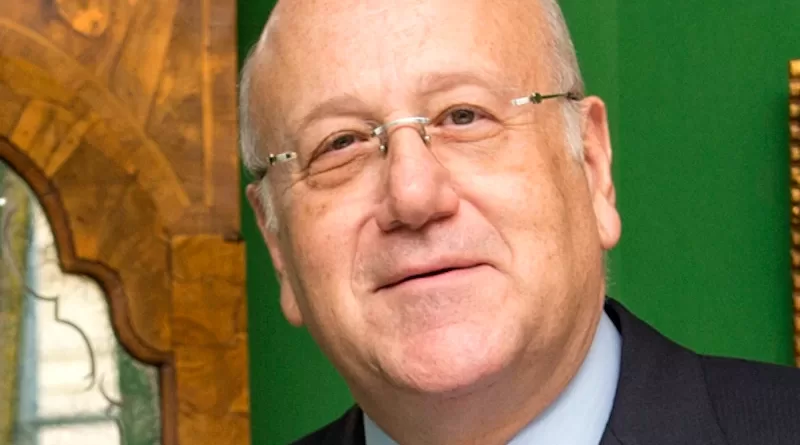Lebanon: Mikati Most Likely To Become Next PM
By Arab News
By Najia Houssari
Lebanese President Michel Aoun will hold binding parliamentary consultations on Monday to nominate a Sunni figure to form a government, with former Prime Minister Najib Mikati expected to lead the new administration.
But even if the decree to designate someone is issued on Monday, the process of forming a government is expected to present many obstacles.
In preparation for the one-day consultations, the parliamentary blocs have been meeting on Sunday to discuss who they want to nominate.
Sources say they are mostly concerned about any candidate’s ability to form a government after former Prime Minister Saad Hariri failure nine months after he was designated. Hariri’s episode followed Ambassador Mustapha Adib stepping down in September 2020, less than two months after he was designated, for failing to achieve the same goal.
Meanwhile, caretaker Prime Minister Hassan Diab has been running a government that resigned following the Aug. 4 Beirut explosion. The politicians, who are divided by sectarianism but united by corruption, have been failing to form a government that would implement the reforms required by the international community to help Lebanon emerge from its unprecedented economic crisis.
At the same time, Aoun and his political team are insisting on obtaining the blocking third in any government, which they would fill with Christian ministers.
The Free Patriotic Movement (FPM) is against designating Mikati because it believes he represents “an extension of Hariri and is not popularly accepted due to the lawsuits filed against him.”
The Lebanese Forces (LF), on the other hand, decided not to nominate anyone, arguing: “It is time for early parliamentary elections, not a government.”
These two objections warn of the possibility of either a party forming a government soon, or postponing parliamentary consultations to designate a prime minister to form a government that would later gain the parliamentary vote of confidence. Deputy Parliament Speaker Elie Ferzli said: “The fact that two Christian blocs refrain from nominating Mikati does not mean that he cannot be designated. There are 22 Christian MPs who do not belong to those two blocs; they were also elected by Christians. Two blocs cannot speak for all Christians.”
There are 19 Christian MPs left in the FPM bloc and 15 Christian MPs within the LF bloc, bringing the total to 34 MPs, while 30 others are either independent or left Gerbran Bassil’s bloc, and represent the Christians outside those two blocs.
On Sunday, the majority of the political blocs were hesitant over the issue of nominating a prime minister-designate, but Mikati seems to be the most popular choice.
Pierre Bou Assi, an MP in the LF bloc, said: “The LF’s decision not to nominate anyone to form the government is not related to the possible candidates, but to the political situation and the political intention of the ruling majority not to assume its responsibilities toward the people,” stressing that “whoever has a sound political intention to form a government, does not leave the country without a government for nine months.”
In October 2020, the LF bloc did not nominate Hariri to form a government.
The FPM MPs did not comment on their stance. However, bloc member MP Simon Abi Ramia said “we have no intention of nominating Mikati; we could either nominate Nawaf Salam or no one at all.”
Rola Al-Tabash, a member of Hariri’s Future bloc, said: “Mikati is a former prime minister and he supports Hariri, who aims to save the country. I believe that after the consultations, it will become clear to everyone who was the one obstructing the formation of the government, as he has previously done.”
The Development and Liberation bloc, headed by Parliament Speaker Nabih Berri, stressed that the bloc is “positive about reaching a government because the situation is difficult and no one can bear it; nothing is stopping the bloc from nominating Mikati.”
The Democratic Gathering parliamentary bloc — headed by Taymour Jumblatt — maintained its position, calling for “compromising in the interest of the nation,” according to MP Bilal Abdullah.
Meanwhile, Hezbollah’s MPs have refrained from expressing any positions prior to the consultations, though they are expected to nominate Mikati.
MP Hassan Fadlallah said: “It is important that designating someone would be an actual prelude to forming a government without any time-wasting obstacles. The priority is to form a rescue government quickly in light of the ongoing collapse.”
Maronite Patriarch Bechara Boutros Al-Rai said on Sunday that he hoped consultations would result in “designating a national reformist figure that would please the revolting people who want real change. This figure also needs to please the Arabs and international community concerned with helping Lebanon to get out of its financial hardship.”
Al-Rai said he hoped everyone would urgently cooperate to form a government, putting aside their power struggles.
“The country is sliding into poverty, chaos is prevailing and state institutions are collapsing. The so-called rights of sects have no value now that Lebanon is facing imminent danger.”

